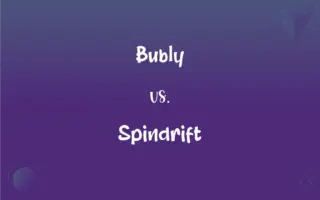Thank You vs. Thanks: What's the Difference?
Edited by Aimie Carlson || By Janet White || Published on February 27, 2024
"Thank you" is a formal expression of gratitude, while "thanks" is a more casual, informal way of expressing appreciation.

Key Differences
"Thank you" is traditionally used in formal or sincere expressions of gratitude, often in professional or more serious contexts. "Thanks," however, is a less formal, more colloquial way of expressing gratitude, typically used in casual conversations or among friends.
The phrase "thank you" is often chosen for its emphasis on the individual, making it more personal and direct. In contrast, "thanks" can be seen as a breezier, more general acknowledgment, suitable for everyday interactions where formality is not required.
In written communication, "thank you" is preferred in formal letters, emails, or notes, conveying a higher level of appreciation. "Thanks" is more commonly used in informal texts, emails, or social media posts, reflecting a relaxed tone.
The choice between "thank you" and "thanks" can also depend on the level of gratitude the speaker wishes to convey; "thank you" often implies a deeper sense of appreciation. "Thanks" can sometimes be perceived as less emphatic or heartfelt.
In certain cultures, the use of "thank you" might be expected in situations of significant importance or formality, whereas "thanks" might be reserved for more casual, everyday interactions.
ADVERTISEMENT
Comparison Chart
Formality Level
More formal and sincere.
Less formal and more casual.
Context of Use
Professional, serious situations.
Casual, everyday conversations.
Written Communication
Used in formal letters and emails.
Common in informal texts and emails.
Conveyance of Gratitude
Implies deeper appreciation.
Seen as breezier, less emphatic.
Cultural Perception
Expected in formal scenarios.
Suitable for informal settings.
ADVERTISEMENT
Thank You and Thanks Definitions
Thank You
Used to show sincere appreciation.
Thank you for helping me move.
Thanks
Can be used among friends or peers.
Thanks for the ride!
Thank You
A formal expression of gratitude.
Thank you for your generous donation.
Thanks
Suitable for quick acknowledgments.
Thanks, I got it from here.
Thank You
Appropriate in professional contexts.
Thank you for your prompt response.
Thanks
Often used in brief, informal communications.
Got your message – thanks!
Thank You
Expressed in situations of deep gratitude.
Thank you for your kind words during a difficult time.
Thanks
Used in informal or everyday situations.
Thanks, I’ll take your advice.
Thank You
Often accompanied by the person's name for personalization.
Thank you, Mrs. Smith, for your advice.
Thanks
A casual way to express gratitude.
Thanks for the coffee!
Thank You
An expression of gratitude
Said their thank-yous and departed.
Thanks
Used to express thanks.
Thank You
An expression of gratitude.
I must offer a big thank-you to my agent for getting me this job.
Thanks
Used to express appreciation or gratitude.
Could you give me a hand, please? — Yes, sure. — Thanks.
Your last gift, for which thanks, made my family so happy.
Thank You
(as a modifier before a noun) That expresses thanks.
A thank-you letter
Thanks
An expression of gratitude.
After all I’ve done, a simple acknowledgment is all the thanks I get?
Thanks
Grateful feelings or thoughts.
Thanks
(obsolete) thank
Thanks
An acknowledgment of appreciation
Thanks
With the help of or owing to;
Thanks to hard work it was a great success
FAQs
Can "thank you" be overused?
Overuse might lessen its impact, but it's always polite.
Can "thanks" be used in professional emails?
It can be, but "thank you" is preferable for formality.
Should "thank you" be used in business meetings?
Yes, "thank you" is appropriate in business settings.
Is "thanks" okay to use with friends?
Absolutely, it's casual and friendly.
Is "thanks" appropriate in a thank-you note?
"Thank you" is more suitable for a thank-you note.
Can "thanks" seem too informal?
In formal contexts, it might seem too casual.
Should "thank you" be used in customer service?
Yes, it's preferred for its formality and respect.
Is "thank you" appropriate in all cultures?
Generally yes, but cultural norms vary.
Is "thank you" more respectful than "thanks"?
Yes, "thank you" is generally more formal and respectful.
Is "thanks" suitable for text messages?
Yes, "thanks" is common in informal texts.
Can "thanks" be seen as dismissive?
In certain formal situations, it might be perceived that way.
Can "thanks" be used in a professional setting?
It can, but it depends on the workplace culture.
Can "thank you" be used to express deep gratitude?
Yes, it effectively conveys deep appreciation.
Does "thanks" imply less gratitude?
Not necessarily, but it can be perceived as less emphatic.
Should children be taught to say "thank you"?
Yes, it's important for teaching manners.
Is "thanks" suitable for expressing gratitude to a stranger?
Yes, it's fine in casual, brief interactions.
Does the choice between "thank you" and "thanks" depend on age?
Not typically, but "thank you" is more formal at any age.
Can "thanks" be used to respond to a compliment?
Yes, it's a casual way to acknowledge a compliment.
Is "thank you" necessary in formal letters?
Yes, it's standard in formal correspondence.
Is "thank you" used internationally?
Yes, it's widely understood and used globally.
About Author
Written by
Janet WhiteJanet White has been an esteemed writer and blogger for Difference Wiki. Holding a Master's degree in Science and Medical Journalism from the prestigious Boston University, she has consistently demonstrated her expertise and passion for her field. When she's not immersed in her work, Janet relishes her time exercising, delving into a good book, and cherishing moments with friends and family.
Edited by
Aimie CarlsonAimie Carlson, holding a master's degree in English literature, is a fervent English language enthusiast. She lends her writing talents to Difference Wiki, a prominent website that specializes in comparisons, offering readers insightful analyses that both captivate and inform.






































































